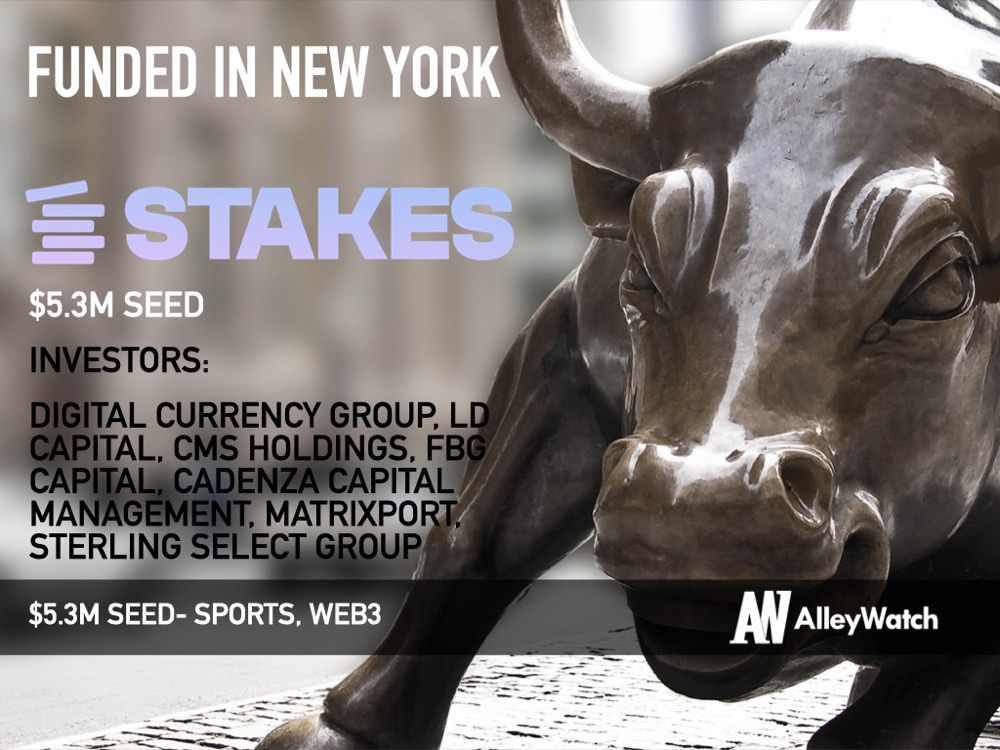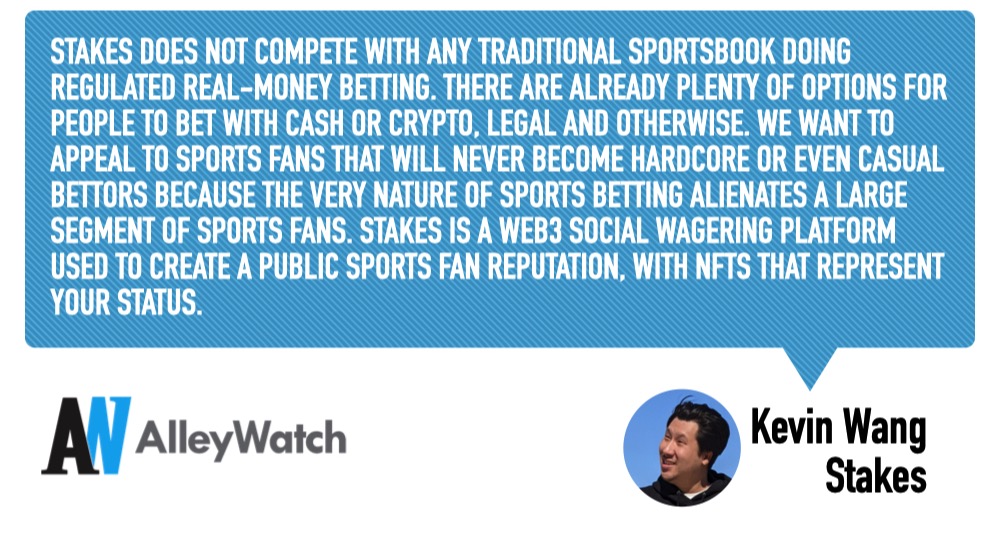Since mobile sports betting was introduced in New York the last weekend in January, more than $6B has been wagered. While this has been an outlet for avid sports bettors, there are still a large number of sports aficionados that are looking for social ways to share their love of sports without actually betting money on outcomes. Stakes is a sports wagering platform that allows sports fans to place friendly bets and earn NFTs. All results are recorded on the blockchain, giving users bragging rights and an immutable track record with the NFT serving as a hedonistic benefit based on performance or what the company calls “proof-of-flex”. There is absolutely no monetary exchange on the platform, instead, Stakes chooses to focus on the communal aspects of sports fandom. Stakes’ app is currently in open beta and the company is a recent graduate of IAC’s incubator program.
AlleyWatch caught up with Stakes Founder and CEO Kevin Wang to learn more about the business, the company’s strategic plans, recent round of funding, and much, much more…
Who were your investors and how much did you raise?
We raised a $5.3M seed round from Digital Currency Group, FBG Capital, LD Capital, Cadenza Ventures, Matrixport Ventures, CMS Holdings, Sterling Select Group, and Founders First.
Tell us about the product or service that Stakes offers.
Stakes is a social sports platform where users can make free, friendly wagers against and earn NFTs as digital bragging rights. We want to create your sports fan track record on the blockchain so you can prove your knowledge.
 What inspired the start of Stakes?
What inspired the start of Stakes?
The idea for Stakes was conceived at the end of 2018 when I was looking into the Supreme Court’s repeal of PASPA, which effectively paved the way for State-licensed sports betting in the US. I started to talk to friends about how exciting a development this was, but the responses I got surprised me. Most of my friends, despite being huge sports fans, seemed uninterested in traditional sports betting, whether it was legal or not. They didn’t want to gamble away their money and many of them didn’t even understand the technical jargon of money lines, parlays, or teasers used in traditional sports betting parlance. They were never going to become hardcore sports bettors. However, somewhat counterintuitively, almost all of them were active in fantasy leagues with friends, or regularly participated in office pools for March Madness, or Super Bowl Squares. Even when those involved cash buy-ins, it seemed like the money was incidental. It’s all about the social camaraderie, the trash-talking, the bragging rights. Almost all of them were also in group chats making sports predictions, friendly casual wagers, and bragging to each other when their sports predictions came true. This is supported by a report Twitter put out in 2019 (see attached) that included why Twitter users participate in fantasy sports, the top two reasons were Sense of Community and Proving Knowledge. In last place? To make money. So even when fantasy leagues are played for money, it’s the least important reason why they are played.
It confirmed what I knew since I was a young kid, that sports are inherently a communal experience. Sports fans are some of the most passionate communities we have in society. Musical tastes can change, a band you loved in high school might not interest you anymore when you’re older. It’s common for a sports fan to be a fan of their favorite sport or team for life, in many cases, it’s even passed down from generation to generation as a family heirloom. This was certainly the case for me growing up with my stoic Taiwanese immigrant father. He rarely showed affection, but when it came to sports, it was like a switch flipped. I got to see the full range of his emotions after every Knicks heartbreak and every Michael Chang win. Sports is how we bonded.
For Stakes, I wanted to create a new kind of wagering platform that didn’t rely on traditional real-money betting, but something that focused on the bragging rights and friendly trash-talking aspects of being a sports fan. Something that would appeal to every sports fan. Imagine unbundling sports hot takes from Twitter and making it a competitive game.
How is Stakes different?
Stakes does not compete with any traditional sportsbook doing regulated real-money betting. There are already plenty of options for people to bet with cash or crypto, legal and otherwise. We want to appeal to sports fans that will never become hardcore or even casual bettors because the very nature of sports betting alienates a large segment of sports fans. Stakes is a web3 social wagering platform used to create a public sports fan reputation, with NFTs that represent your status. Anyone can create their predictions and others can wager with video game virtual currency to agree or disagree with you. Stakes is always free to play and is not considered gambling. We are differentiating ourselves from real-world sports betting, prediction markets, fantasy sports, free-to-play prediction games, and social media platforms. We have elements of each, but we believe we are creating a new category of sports wagering platform that is web3 native.
What market does Stakes target and how big is it?
Stakes is targeting the estimated 200M sports fans in the US
What’s your business model?
We monetize sales and secondary transactions of our NFTs.
What are your post-COVID office plans??
Still TBD as we scale the team.
What was the funding process like?
It was intense but our round came together pretty quickly I have been fortunate enough to have been around the crypto industry for a long time and was able to tap my network of investors.
What are the biggest challenges that you faced while raising capital?
Obviously, a big challenge of fundraising is dealing with a lot of people passing because they didn’t quite get the value prop or we were too early for them. We were fortunate enough to be oversubscribed so a big challenge was how to give allocations.
Obviously, a big challenge of fundraising is dealing with a lot of people passing because they didn’t quite get the value prop or we were too early for them. We were fortunate enough to be oversubscribed so a big challenge was how to give allocations.
What factors about your business led your investors to write the check?
I would guess primarily the team we have, my background, the endorsement of some of our early investors that I worked with previously and knew well. And lastly the product and signals we have to date.
What are the milestones you plan to achieve in the next six months?
We are focused on hiring key technical roles, building out our roadmap, running experiments and finding Product/Market fit.
What advice can you offer companies in New York that do not have a fresh injection of capital in the bank?
It’s cliche but building strong relationships is always helpful, maybe not for this round but you never know down the road when you can help them or they can help you.
Where do you see the company going now over the near term?
Hopefully, we are able to execute and deliver on our KPIs and get to Product/Market fit.
What’s your favorite outdoor dining restaurant in NYC?
Lil’ Frankies in the East Village.





